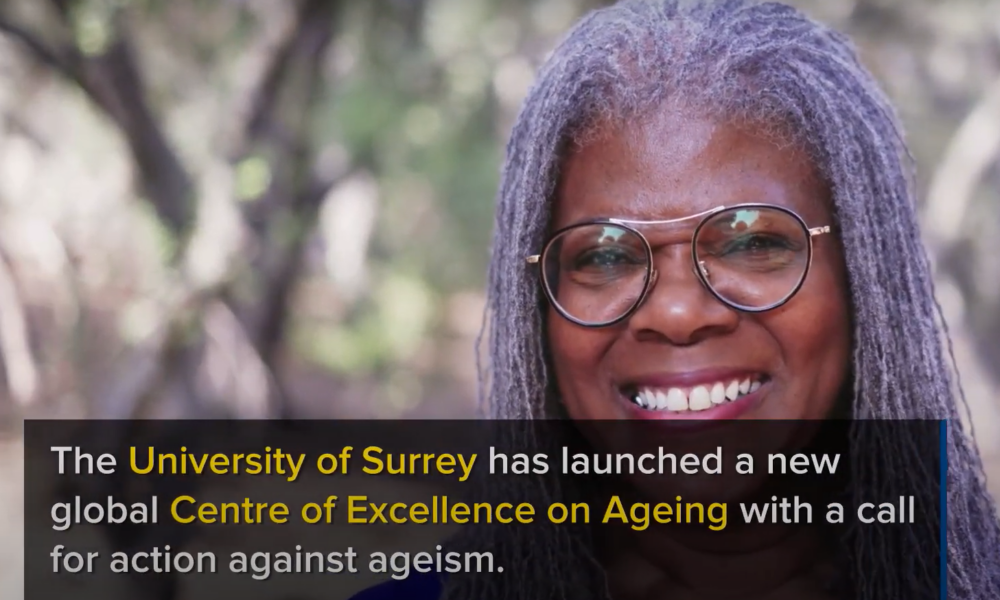
New global Centre of Excellence on Ageing launches with a clear call for action against ageism
Combatting ageism and promoting the interests of older people through scientific research is crucial, particularly as a response to the discriminatory treatment they faced during the pandemic, according to the Director of the University of Surrey’s new Centre of Excellence on Ageing.
The University of Surrey’s new centre is in partnership with the Global Initiative on Ageing (GIA), which operates under the auspices of the United Nations. The Centre was formally launched on 26 April 2023, with the University hosting a formal dinner that brings together notable scholars and stakeholders focused on ageing. This was followed by a one-day showcase on 27 April, celebrating Surrey’s work in areas such as ageing and work, artificial intelligence and ageing, sleep patterns, nutrition, and generational shifts in ageing.
Professor Max Lu, President and Vice-Chancellor of the University of Surrey, said:
“The Surrey community is deeply passionate about improving the standard of wellbeing for our elderly population – this is evidenced in our internationally-recognised research activities in areas such as improving the quality of sleep of individuals living with dementia, improving inclusion of the elderly population in the tourism and hospitality sector, and investigating the mechanisms underlying osteoarthritis and finding ways to treat it.
“The new Centre of Excellence for Ageing will serve to amplify these efforts, allowing us to understand more and provide genuine solutions that help to enrich the lives of our elderly relatives, friends, and fellow citizens while safeguarding their rights.”
More than 1.1 billion people worldwide are over 65 years of age; by 2050, the global population will be more than 2.1 billion.
GIA’s mission is to support the goals laid out within the UN Decade of Healthy Ageing, and the Sustainable Development Goals (SDGs), by improving the overall standard of living, participation and inclusion of the world’s ageing population. One of GIA’s key implementing partners is the UN’s Institute for Training and Research, UNITAR, which is dedicated to training and capacity building on a whole range of policy-based areas.
Professor Paul A. Townsend, the inaugural Director of the Centre of Excellence on Ageing and Pro-Vice-Chancellor and Executive Dean of the Faculty of Health and Medical Sciences at the University of Surrey, said:
“I am incredibly proud to be part of our new Centre of Excellence on Ageing, which is a critical part of a global movement that recognises the need for a better understanding of the life course and ageing. We will focus on processes ranging from preconception through to appreciating the treatment of our elderly population. The pandemic disproportionately affected our seniors, leaving them to face discrimination and a lack of sympathy, with many left in care homes unable to see their families. This new Centre is dedicated to helping older people to benefit from the latest research and greatest advances in science today. They should receive the respect, care and quality of life that they deserve. ”
Professor Amelia Hadfield, Dean International at the University of Surrey, said:
“We are thrilled to be launching the new Centre of Excellence on Ageing, which will utilise renowned thinkers from our University to conduct cutting-edge research and provide innovative solutions to improve the lives of our elderly population.
“By partnering with organisations like the Global Initiative on Ageing and the wider United Nations as a whole, our University is taking a truly global approach to address the challenges of an ageing population. We are confident that our efforts will have a positive impact on seniors around the world.”
Silvia Neira, Vice President of GIA, said:
“We are thrilled to announce the launch of the Centre of Excellence on Ageing at the University of Surrey. This new initiative will build on the incredible work of the GIA Foundation, expanding our capacity to research and engage with the many intersections of ageing and longevity.”
###
- Professor Paul Townsend is available for interview upon request
- For more information, please contact the University of Surrey’s press office via mediarelations@surrey.ac.uk